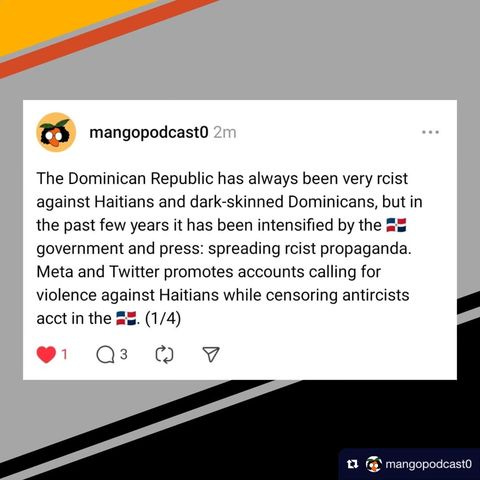Welcome to the latest edition of Woy Magazine’s biweekly newsletter, providing you with must-know news and commentary on Haiti and our Diaspora.
We can’t do this work without you. We have introduced a paid subscription option for our newsletter. Consider switching your free subscription to a paid one to support our work! Click the button below.
Mezire anvan w koupe
Measure before you cut
(Haitian proverb)
CHAY LA | Main Story
Biden Fini
The Biden Administration will not be renewing the Human Parole Program for any of the participating countries involved in this iteration of the initiative, including Haiti.
Around 214,000 Haitians were approved for parole, as well as 117,000 Venezuelans, 111,000 Cubans, and 96,000 Nicaraguans. The end of the program means no extension will be provided for beneficiaries beyond the two years they are allowed to live in the US. This means those who are unable to obtain legal status following the end of their parole will have to return to their respective countries. Haitians may be eligible to apply for Temporary Protected Status following the extension and redesignation of Haiti for this program:
Eligible individuals who do not have TPS may submit an initial Form I-821, Application for Temporary Protected Status, during the initial registration period that runs from July 1, 2024, through Feb. 3, 2026. Applicants also may apply for TPS-related Employment Authorization Documents and for travel authorization. Applicants can request an EAD by submitting a completed Form I-765, Application for Employment Authorization, with their Form I-821, or separately later. (Source: DHS)
ON THIS DAY
Perejil
Since tensions began to escalate last year between Haiti and the Dominican Republic, following discriminatory immigration policies championed by Luis Abinader, the Dominican government recently announced plans to begin deporting 10,000 Haitians every week.
Coincidentally, October 2nd marked the 87th anniversary of the Parsley (Perejil) Massacre, where Dominican President Rafael Trujillo ordered the killing of thousands of Haitians and Dominicans of Haitian descent in 1937. The massacre lasted several days on the border region along the Massacre River — a renewed site of conflict between the two countries due to the construction of the Wanament canal.
Back to School
Students returned to school on October 1st across Haiti in Okay, Jeremi, Okap, and Pòtoprens. And yet, in the capital, thousands of people are still taking shelter in several public and private schools. One of the transitional government's main challenges was to improve the security conditions, allow people to return home, and free up these spaces for kids to return to school.
L’occupation de la majeure partie du centre-ville et des territoires situés au sud et au nord de la région métropolitaine de Port-au-Prince s’est poursuivie ces dernières semaines, tandis que les nouveaux blindés reçus fin août patrouillent presque continuellement les quartiers encore libres. La violence s’est déplacée ces derniers jours vers la commune rurale de Pont-Sondé, dans le département de l’Artibonite. (Source: Dèyè Mòn)
Instead, both the government and the Kenyan mission have yet to show any significant progress in restoring enough security to the capital and elsewhere. In the way of support, 20,000 gourdes (USD 150) has been offered to 200,000 parents, with an extra month's salary for government employees to assist with back-to-school costs. The government has also distributed free books and school supplies.
Prime Minister Gary Conille acknowledged this, explaining that about 40 public schools in Pòtoprens remain inaccessible because they are either in neighborhoods under gang control or are being used as shelters for thousands of displaced people across the capital. As a temporary measure, the government rented buildings to allow large schools like Lycée Marie Jeanne and Lycée des Jeunes Filles to open this past week.
Earlier this year, in collaboration with Christian Science Monitor, we highlighted what educators in Pòtoprens are doing to protect children’s right to an education.
Despite these real challenges, Haitians are adept at meeting crises head on. And one need not look further than the country’s primary and secondary schools to understand the extent of Haiti’s troubles, as teachers and administrators scramble to educate a generation otherwise lost to insecurity.
“We are no strangers to interruption,” says Ralph Ganthier, director of Collège Florian Ganthier (CFG). The private Christian K-12 school off Route de Frères is running one month later than the school calendar to make up for the weeks of canceled classes due to violence this year. “We haven’t had an uninterrupted school year since 2017.”Source: Christian Science Monitor
Fifty percent of the people displaced from Pòtoprens and Latibonit have moved to the Southern departments of the country. Schools in places like Okay, where security isn’t an issue, are overwhelmed by the influx of students from the capital.
Nou Bouke Tann
Groups like Nou Bouke Tann (interviewed on Le Point above) in the south are pushing the government to continue a project to modernize the Antoine Simon des Cayes Airport in Okay. They argue that breaking the isolation of the southern departments (Sid, Grandans, Nip, Sidès) while Pòtoprens is under siege from the gangs is one way to strengthen the country, bringing jobs, particularly as thousands of people are moving south to start over.
The newly revived petition speaks to a particularly poignant issue for the country, where major economic and political activities are centralized in the capital, Pòtoprens, which has had a crippling effect on other parts of the country. Difficult access to goods, services, and safe transportation has triggered inflation and shuttered many businesses.
Calls to decentralize government public investments by civil society organizations like You Bouke Tann and others like it are an essential part of the democratic process and counter the way the Republic of Pòtoprens overshadows the rest of the country.
At present, the airport in Okay largely serves as a domestic hub, and a bid for an international airport in the Gran Sid represents a plea for more economic opportunities for the region. The online petition has gained over 11,000 signatures. If you would like to lend your support, you can sign the petition here.
Pont Sonde Massacre
In the early morning of October 3, around 3 AM, armed members of the “Gran Grif” gang attacked the Pond Sonde community in Latinbonit. The massacre was orchestrated in retaliation by the Savien gang, following resistance from a group of drivers who were refusing to pay the exorbitant tolls imposed by the gang at a local checkpoint. 115 people are reported dead, and 6,300 people have been displaced.
On September 27th, the leader of the Gran Grif gang, Luckson Elan, was sanctioned by the UN, along with Propane Victor, for arms trafficking. This attack on the community of Pond Sonde happened with no strategic preparations or response from the government despite the threats made by Gran Grif. In fact, they attacked the population again on October 8th after the police and Kenyan troops showed up.





